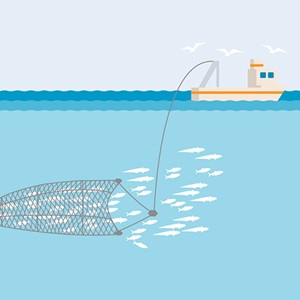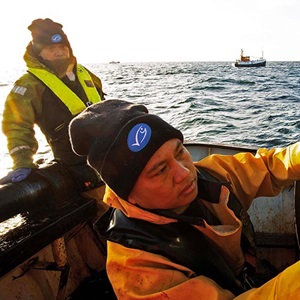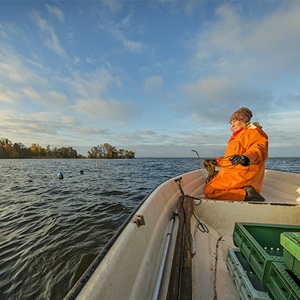By Ritu Singh
30 October 2023
In the 1970s Spanish cod fishers left Canadian waters for the Northeast Arctic where they've kept stocks sustainable and implemented a host of improvements to protect other species and habitats.
The story of sustainable cod fishing in the Barents Sea begins 4,500 km away, in Canada’s Grand Banks. Three decades ago, the Canadian fishing grounds suffered a catastrophic collapse, which has provided valuable lessons for the AGARBA fishers in the far North.
AGARBA (Asociación Nacional de Armadores de Buques de Pesca de Bacalao) is a Spanish association of cod fishing companies working in the Barents Sea. In 2013 its fishery became the first Spanish operation to be independently certified as sustainable to the MSC Fisheries Standard.
Fishery name
AGARBA Spain Barents Sea cod (now part of the Northeast Arctic cod and haddock demersal fishery)
Species fished
Atlantic cod (Gadus morhua)
Gear types used
Bottom trawls

Keeping cod sustainable
The Barents Sea is known to be the main nursery and feeding area for cod in the Northeast Arctic. The Norwegian and Russian governments, who manage the region’s fisheries, cooperate to use robust science to ensure stocks are not overfished.
Effective management, and strong harvest control rules, promoted by certification to the MSC Standard, regulate how much fishing can take place. As well as adhering to these regulations, AGARBA voluntarily opted to use an increased mesh size of 145mm on their nets (the minimum permitted is 130mm), which has resulted in reduced catches of undersized and unwanted fish. The company has also worked to acquire and share more data on redfish and wolffish that might be captured inadvertently.
“The main beneficiaries of a sustainable stock are the fishermen!”
Certification and improvement
Ignacio Urcola, the General Manager of VELASPEX, one of the companies that form AGARBA say the association was prompted to pursue certification because they understood that consumers were interested in certified products.
VELASPEX clearly remember the consequences of the Grand Banks and the importance of sustainability for nature and livelihoods. Urcola says, “fishing is a long-term business” and adds with a smile, “The main beneficiaries of a sustainable stock are the fishermen [and] you can’t take a different attitude if you want to take care of your business.”
Assessment to the MSC Fisheries Standard is a participative process; all comments and objections are welcomed. For AGARBA, the eighty invited stakeholders included Greenpeace and Oceana, as well as WWF, who congratulated AGARBA upon achieving certification.
Nonetheless, assessors placed six conditions of improvement on the certificate. These all centered on the effects of bottom trawling on habitats and other species in the Barents Sea.
AGARBA’s vessels use otter trawls and the fishery must ensure the gear does not cause serious or irreversible harm to the seabed or the geological structures that form the habitat. As part of its recertification process the association has implemented mapping of all its activity to evaluate and control the interaction with the seabed.
The UN FAO quote research from the Barents Sea that found that otter trawl door marks on the seabed were “shown to disappear within five months”. Additionally, AGARBA deploy lighter gears and special ‘rockhopper’ technology to minimise contact with the seabed. Some vessels use 'floating’ trawl doors that don’t touch the sea floor.
Protecting Vulnerable Marine Ecosystems
The Norwegian government has stringent regulations to protect Vulnerable Marine Ecosystems (VMEs) particularly those that are home to animals that can’t move e.g., corals or sponges. The regulations set a catch threshold for these animals. If this is exceeded, the fishery must report the catch and its location and ‘move-on’ by two nautical miles.
In 2020, AGARBA self-imposed a revised and more restrictive code of conduct for interactions with bycatch and VMEs. It stipulates that encounters with any single seabed species above 1 kg be reported in logbooks, and pictures must be taken to facilitate species identification. Sponge and coral garden locations must also be logged.
AGARBA’s code comes into operation when the fishery encounters half the number of sponges or two-thirds of corals specified in Norwegian regulations.
The move-on rule also applies to vessels reporting incidental catches of endangered, threatened and protected (ETP) species such as seals, basking sharks and starry rays.
Furthermore, the fishery has developed a strategy to minimise mortalities and ensure it does not hinder the recovery of ETP species. Consecutive assessment reports state “interactions with ETP species are highly unlikely, and mainly involve sightings of marine mammals such as seals. None caught.”

AGARBA vessel Arosa 9, port of Vigo
Conditions closed
In the decade since certification, AGARBA’s program of improvements and work with scientists and NGOs to reach best practice levels has allowed them to close all conditions of MSC certification.
Many lessons have been learned since the Grand Banks salt cod bonanza. Even the cod AGARBA lands is now rarely sold as salted, with 90% of the NE Arctic product is sold as sustainably caught frozen cod fillets.




